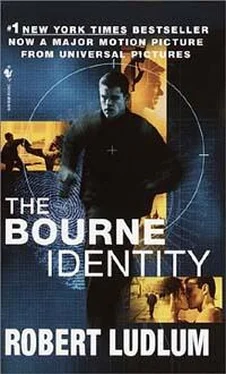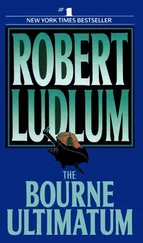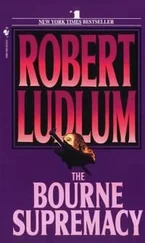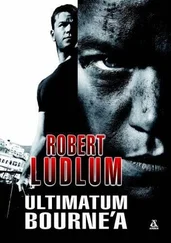“May I help you?”
“Are you d’Amacourt?” asked Jason.
“I am Antoine d’Amacourt, yes. And who, may I ask, is calling?”
“Good! I should have been given your name in Zurich. I’ll make certain next time certainly,” said Bourne, the redundancy intended, his accent American.
“I beg your pardon? Would you be more comfortable speaking English, monsieur?”
“Yes,” replied Jason, doing so. “I’m having enough trouble with this damn phone.” He looked at his watch; he had less than two minutes. “My name’s Bourne, Jason Bourne, and eight days ago I transferred four and a half million francs from the Gemeinschaft Bank in Zurich. They assured me the transaction would be confidential.”
“All transactions are confidential, sir.”
“Fine. Good. What I want to know is, has everything cleared?”
“I should explain,” continued the bank officer, “that confidentiality excludes blanket confirmations of such transactions to unknown parties over the telephone.” Marie had been right, the logic of her trap clearer to Jason.
“I would hope so, but as I told your secretary I’m in a hurry. I’m leaving Paris in a couple of hours and I have to put everything in order.”
“Then I suggest you come to the bank.”
“I know that,” said Bourne, satisfied that the conversation was going precisely the way Marie foresaw it. “I just wanted everything ready when I got there. Where’s your office?”
“On the main floor, monsieur. At the rear, beyond the gate, center door. A receptionist is there.”
“And I’ll be dealing only with you, right?”
“If you wish, although any officer—”
“Look, mister,” exclaimed the ugly American, “we’re talking about over four million francs!”
“Only with me, Monsieur Bourne.”
“Fine. Good.” Jason put his fingers on the cradle bar. He had fifteen seconds to go. “Look, it’s 2:35 now—” He pressed down twice on the lever, interrupting the line but not disconnecting it.
“Hello? Hello?”
“I am here, monsieur.”
“Damn phones! Listen, I’ll—” He pressed down again, now three times in rapid succession.
“Hello? Hello?”
“Monsieur, please—if you’ll give me your telephone number.”
“Operator? Operator?”
“Monsieur Bourne, please—”
“I can’t hear you!” Four seconds, three seconds, two seconds. “Wait a minute. I’ll call you back.” He held the lever down, breaking the connection. Three more seconds elapsed and the phone rang; he picked it up. “His name’s d’Amacourt, office on the main floor, rear, center door.”
“I’ve got it,” said Marie, hanging up.
Bourne dialed the bank again, inserted coins again. “Je parlais avec Monsieur d’Amacourt quand on m’a coupe …”
“Je regrette, monsieur.”
“Monsieur Bourne?”
“D’Amacourt?”
“Yes—I’m so terribly sorry you’re having such trouble. You were saying? About the time?”
“Oh, yeah. It’s a little after 2:30. I’ll get there by 3:00.”
“I look forward to meeting you, monsieur.”
Jason reknotted the phone, letting it hang free, then left the booth and walked quickly through crowds to the shade of a storefront canopy. He turned and waited, his eyes on the bank across the way, remembering another bank in Zurich and the sound of sirens on the Bahnhofstrasse. The next twenty minutes would tell if Marie was right or not. If she was, there would be no sirens on the rue Madeleine.
The slender woman in the wide-brimmed hat that partially covered the side of her face hung up the public phone on the wall to the right of the bank’s entrance. She opened her purse, removed a compact and ostensibly checked her makeup, angling the small mirror first to the left, then to the right. Satisfied, she replaced the compact, closed her purse, and walked past the tellers’ cages toward the rear of the main floor. She stopped at a counter in the center, picked up a chained ballpoint pen, and began writing aimless numbers on a form that had been left on the marble surface. Less than ten feet away was a small, brass-framed gate, flanked by a low wooden railing that extended the width of the lobby. Beyond the gate and the railing were the desks of the lesser executives and behind them the desks of the major secretaries—five in all-in front of five doors in the rear wall.
Marie read the name printed in gold script on the center door.
M. A. R. D’Amacourt
Vice-President
Comptes a L’Étranger et Devises
It would happen any moment now—if it was going to happen, if she was right. And if she was, she had to know what Monsieur A.R. d’Amacourt looked like; he would be the man Jason could reach. Reach him and talk to him, but not in the bank.
It happened. There was a flurry of controlled activity. The secretary at the desk in front of d’Amacourt’s office rushed inside with her notepad, emerged thirty seconds later, and picked up the phone. She dialed three digits—an inside call—and spoke, reading from her pad.
Two minutes passed; the door of d’Amacourt’s office opened and the vice-president stood in the frame, an anxious executive concerned over an unwarranted delay. He was a middle-aged man with a face older than his age, but striving to look younger. His thinning dark hair was singed and brushed to obscure the bald spots; his eyes were encased in small rolls of flesh, attesting to long hours with good wine. Those same eyes were cold, darting eyes, evidence of a demanding man wary of his surroundings. He barked a question to his secretary; she twisted in her chair, doing her best to maintain her composure.
D’Amacourt went back inside his office without closing the door, the cage of an angry cat left open. Another minute passed; the secretary kept glancing to her right, looking at something—for something. When she saw it, she exhaled, closing her eyes in relief.
From the far left wall, a green light suddenly appeared above two panels of dark wood; an elevator was in use. Seconds later the door opened and an elderly elegant man walked out carrying a small black case not much larger than his hand. Marie stared at it, experiencing both satisfaction and fear; she had guessed right. The black case had been removed from a confidential file inside a guarded room and signed out by a man beyond reproach or temptation—the elderly figure making his way past the ranks of desks toward d’Amacourt’s office.
The secretary rose from her chair, greeted the senior executive and escorted him into d’Amacourt’s office. She came out immediately, closing the door behind her.
Marie looked at her watch, her eyes on the sweep-second hand. She wanted one more fragment of evidence, and it would be hers shortly if she could get beyond the gate, with a clear view of the secretary’s desk. If it was going to happen, it would happen in moments, the duration brief.
She walked to the gate, opening her purse and smiling vacuously at the receptionist, who was speaking into her phone. She mouthed the name d’Amacourt with her lips to the bewildered receptionist, reached down and opened the gate. She moved quickly inside, a determined if not very bright client of the Valois Bank.
“Pardon, madame—” The receptionist held her hand over the telephone, rushing her words in French, “Can I help you?”
Again Marie pronounced the name with her lips—now a courteous client late for an appointment and not wishing to be a further burden to a busy employee. “Monsieur d’Amacourt. I’m afraid I’m late. I’ll just go see his secretary.” She continued up the aisle toward the secretary’s desk.
“Please, madame,” called out the receptionist. “I must announce—”
Читать дальше












